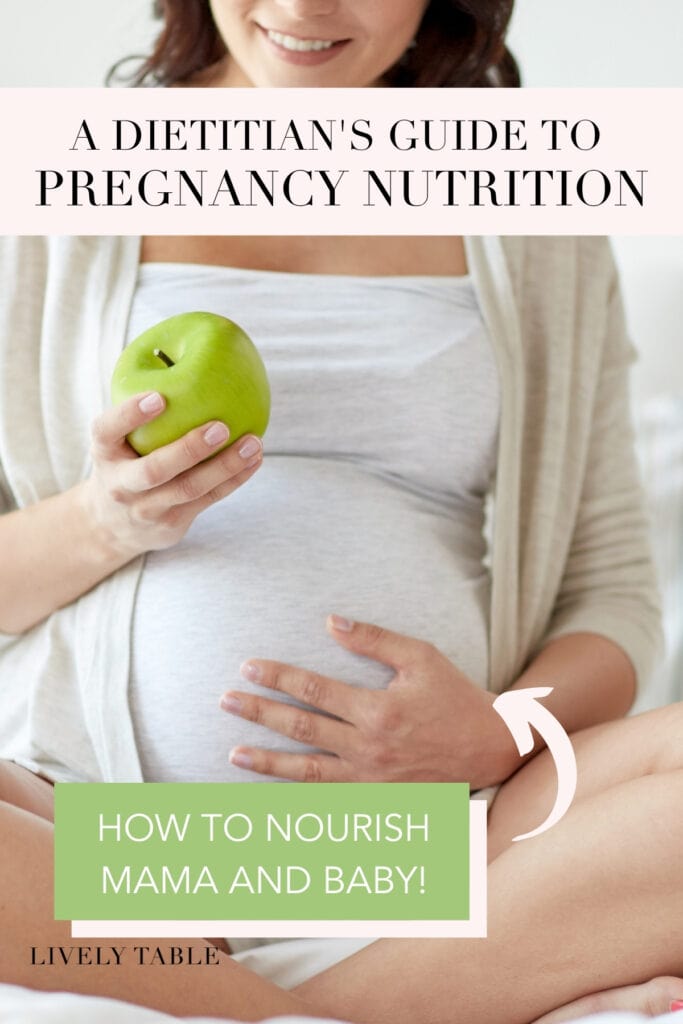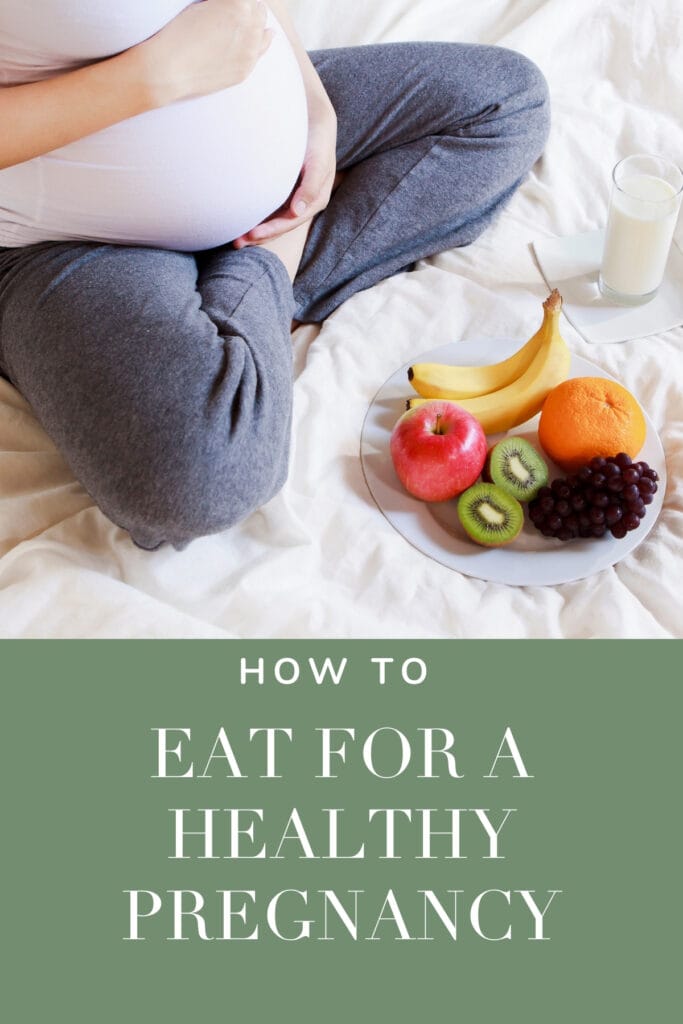Want to know what to eat to nourish yourself and your growing baby during pregnancy? Here's a dietitian approved, simple guide to pregnancy nutrition!

As a dietitian, I get the question, "What do I eat?" all the time. And now as a mom, I get that question even more from newly expecting mothers. Pregnancy is such a beautiful, and often confusing, time. And it's a great time to start thinking about nutrition if you haven't already. Not only for yourself, but to nourish your growing babe, too. I often take for granted how easy it was for me to decide what and how to eat during pregnancy because of my education in the subject, but since receiving a few questions from expecting friends and family, I realize that it definitely does NOT come naturally for most. So here are some basic nutrition guidelines for pregnancy, for a healthy mom and healthy baby! Enjoy nourishing your little one, mama!
General Nutrition Guidelines for Pregnancy
You need lots of energy
Building a human is hard work! And it requires a lot of fuel and a lot of nutrients. That means pregnancy is not the time to go on a low-carb diet or try anything else crazy. And It's definitely not time for weight loss. For the majority of your pregnancy you'll need an excess of calories to help your little one grow and develop. Don't worry if morning sickness has you unable to eat much in the early weeks, your calorie needs really aren't higher in the first trimester, but by the second trimester you'll need roughly 300-400 extra calories per day to fuel your growing babe. By the third trimester, those needs increase by an additional 100 calories, or roughly 400-500 extra calories per day over your usual needs. Don't get too hung up on the numbers, though. Just listen to your body and eat when you're hungry (which for me was all the time!). Pregnancy was the most in tune I've ever been with my body and hunger signals, which was so amazing.
It's all about balance
In general, but especially during pregnancy, you need a healthy balance of carbohydrates, protein and fat. Carbs are the preferred fuel source for your body and brain, so don't skimp! Ideally you want high quality carbs such as whole grains, starchy vegetables, beans, and fruit. But don't be too strict about it.
You also want to make sure you're getting enough fat. Fat helps your baby's brain grow, so it's crucial that you include some in your diet. Focus on healthy fats, like those that are found in olive oil, nuts, avocados, and fish. You especially need the omega-3 fatty acid DHA, which is only found in seafood, so try to eat seafood when you can!
Yes, you should ideally eat plenty of fruit and vegetables to provide all those essential nutrients to you little one (and also to help him recognize those flavors later in life!). But I realize a salad probably doesn't sounds good most of the time. Try to fit produce in where you can - at snacks, in smoothies, on top of oatmeal, etc. And don't forget, fruit with peanut butter is still fruit, and veggies with cheese are still veggies! Allow yourself to indulge in some of your cravings - that's one of the most fun (and sometimes silly) parts of pregnancy! But again, aim for balance.
Hydrate!
Pregnant mamas need lots of water! Your blood volume expands during pregnancy (hello, swelling!) so try to drink plenty of fluids, even though, yes, it will make you pee even more.
Supplements During Pregnancy
Ideally, you should have started taking a prenatal vitamin when you started trying to conceive, however, I know not all babies are planned out that way, so if you aren't, start taking one now! If you don't eat seafood, look for a prenatal with DHA, or add a DHA supplement in addition to your prenatal. (You can also take a peek at the supplements I took during pregnancy!)
Common Pregnancy Symptoms & Diet
Your diet can help with a couple of symptoms that are common throughout pregnancy.
- Morning sickness or nausea are super common in the first trimester. I always found that eating would help curb the nausea. Keep bland foods on hand, such as raw almonds, bananas, crackers, dry toast, oatmeal, smoothies, or pretzels. Avoid strong-smelling foods and anything too greasy. Ginger may also help your nausea, so you can try keeping some ginger candies, ginger ale, or ginger tea on hand.
- Constipation is especially common during pregnancy, due to both hormones and iron in your prenatal. Fluids, fiber, and moving your body will help move things along, so (again) drink plenty of water, take a walk when you have the energy, and eat fiber-rich foods (like fruit, veggies, and oatmeal!). Prunes dipped in peanut butter were one of my favorite snacks during pregnancy.
- For heartburn or indigestion, it's important to eat smaller amounts more frequently. This will be especially helpful as your baby gets bigger and pushes on your stomach. Avoid foods that trigger heartburn. They're different for each person, but common triggers are greasy foods, spicy foods, citrus fruit, caffeine, and gas-forming foods like broccoli and brussels sprouts.
Important Nutrients for Baby Throughout Pregnancy
Baby needs a variety of nutrients to grow and develop. Here are some key nutrients (in no particular order) for baby's development throughout pregnancy and how you can get them:
- B Vitamins - Important for baby's growth and development, and mama's energy! B vitamins are particularly abundant in animal foods such as meat and poultry, eggs, milk, and fish.
- Folate - Folate is important helps baby's brain and spinal cord develop properly. It should be present in your prenatal, and you can get folate from your foods like green leafy vegetables, beans, avocado, nuts, and fortified breakfast cereals.
- Omega 3 fatty acids - Omega-3 fatty acids, and in particular DHA, are important to nourish baby's growing brain. DHA is only found in seafood, so try to aim for two servings of fish per week. If you don't eat fish, make sure you're taking a DHA supplement.
- Calcium - Your growing babe will take all the calcium he needs from your body. Eating enough calcium will help protect your stores so that you don't become deficient. Calcium rich foods include milk and yogurt, fortified OJ, tofu, canned salmon, leafy greens and broccoli.
- Vitamin D - Vitamin D helps with absorption of calcium for baby's bone-building. You can get it from canned salmon, fortified milk, eggs, almonds, and mushrooms.
- Iron - While iron is important for baby's cell functioning, it's especially important for you, mama! Your iron needs go way up during pregnancy, partly due to your expanded blood volume. Iron can be found in meat (especially beef), eggs, leafy greens, and beans.
- Choline - Choline is vital for baby's brain development. You can get it from eggs, meat and poultry, salmon, and cruciferous vegetables like brussels sprouts, broccoli and cauliflower.
Want a detailed breakdown of nutrition for pregnancy? Download my FREE ebook: Nutrition for Pregnancy By Trimester.
*A quick note: This is meant for general guidance for reasonably healthy expecting mamas. It should not be interpreted as individual dietetic counseling or take the place of your doctor's advice. Consult your physician if you have gestational diabetes, preeclampsia, or any other condition that requires dietary changes and special monitoring.



Leave a Reply